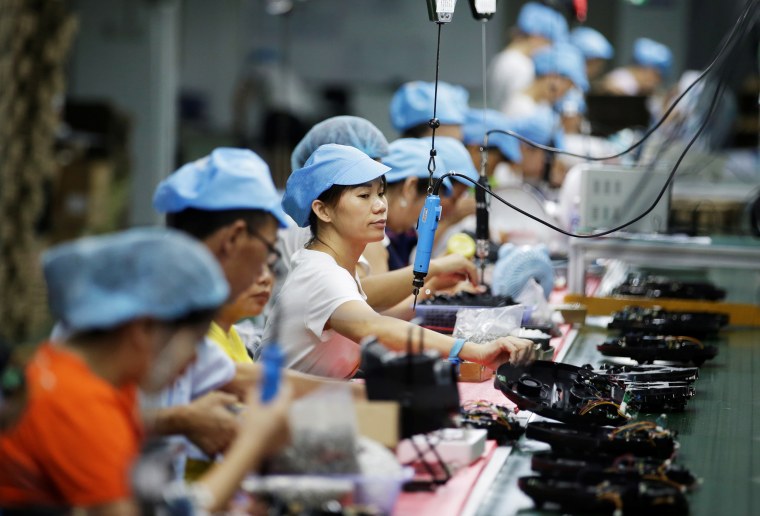The prospect of a “phase one” U.S.-China trade deal that includes a suspension of some tariffs would be good news for American shoppers and investors — not to mention the Chinese government and President Donald Trump’s 2020 campaign, according to international trade experts.
“It seems like the chance of some sort of interim deal is increasing," said Michael O. Moore, a professor of economics and international affairs at George Washington University. "I suspect that’s mainly because Trump would like a victory, especially one that would relieve some pressure in the Midwestern states that are very important to his re-election bid. There are reasons to get this short-term deal done on the Chinese side as well.”
Any deal is likely to include the U.S. canceling a planned tariff on $156 billion of Chinese imports, according to a report from Reuters. That would involve a wide array of consumer goods ranging from clothes and shoes to electronics and toys that initially was scheduled to be implemented last month and currently is set to take effect Dec. 15, as well as Chinese agreements to purchase American agricultural products.
Chinese negotiators also are seeking elimination of the 15 percent tariff the U.S. levied on $125 billion worth of Chinese imports on Sept. 1, as well as a 25 percent tariff on $250 billion worth of imports, primarily consisting of machinery, manufacturing and technological production inputs, Reuters said.
Doug Barry, spokesman for the U.S.-China Business Council, said eliminating tariffs would be a good start, but he stressed the need to find solutions to more entrenched issues facing U.S. multinationals doing business in China.
“We look forward to the next phases of negotiations to include state-owned enterprises, high tech and cybersecurity, and other areas in order to create a more level playing field for American companies as China has long promised,” he said. “China is changing, and we need to work constructively with them to speed up the process.”
But experts say that China’s long-term goal is to avoid addressing those issues now — or later.
“From a Chinese policy perspective, if they can hold off on these fundamental changes in their economy, then they would see that as a policy win,” Moore said.
Beijing is trying to kick the can down the road on U.S. demands that it overhaul its intellectual property protection laws, joint-venture regulations and system of state support for key industries, said Jacob Kirkegaard, a senior fellow at the Peterson Institute for International Economics, adding that China’s goal is to get tariffs rolled back and maintain the pre-trade war status quo.
“I don’t think anybody has any expectations that ‘phase two’ will ever materialize,” Kirkegaard said. “It’s basically a way for China to wait Trump out.”
Economists say the upcoming December sanctions, if not repealed, would have a more direct impact on household budgets than any of the tariffs already in place. “Those would be very significant even if their implementation comes after most people have done their holiday shopping. The impact on consumer spending in 2020 would be significant,” said Paul Christopher, head of global market strategy at the Wells Fargo Investment Institute.
As a result, stocks rallied in response to the prospect of tariff rollbacks. “I think the markets right now are trading off of hope. … Certainly, there’s room for disappointment,” Christopher said.
“Markets, since the beginning of the year, have been willing to price in the optimism,” he added, which means any unexpected hurdles could spook Wall Street. “There’s room here for more volatility, irrespective of what phase one looks like.”
What’s more, this deal is unlikely to either restore jobs and earnings lost in the manufacturing sector, or lead to a widespread about-face of the pullback in business investment that has slowed U.S. economic growth, Kirkegaard predicted. “Trump’s track record as a protectionist is so entrenched I doubt you’re going to see a major reversal in this,” he said.
And with markets already pricing in an easing of trade tensions, Kirkegaard warned that the Trump administration has a dwindling reserve of leverage against Beijing.
“It looks like China is getting more and more of what it wants,” he said. “They’ve got Trump boxed in. He’s already pre-announced this deal. … If it suddenly collapses, Trump has egg on his face.”
